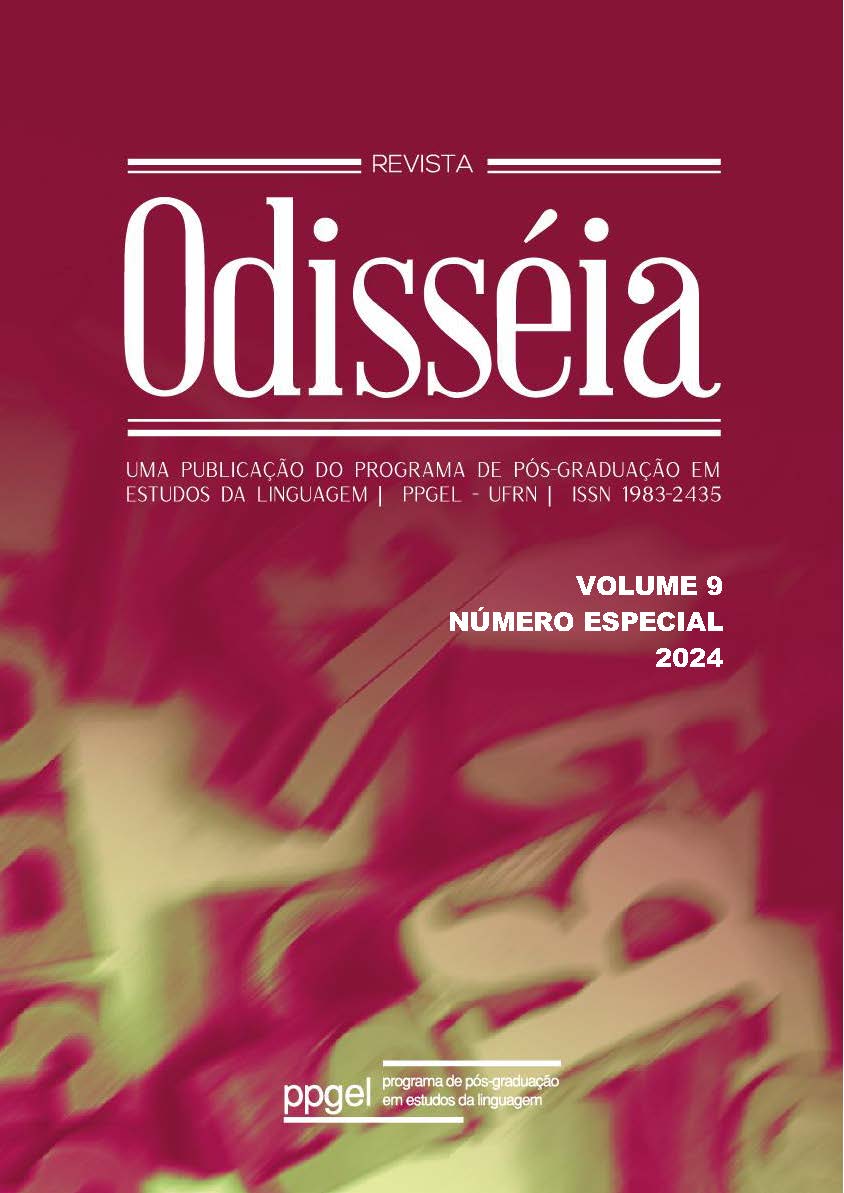“IF I COULD, I WOULD KILL THEM ALL AND START ANEW”: POINT OF VIEW AND PUBLIC CONTROVERSY ABOUT HOMOAFFECTIVITY IN A RELIGIOUS SERMON
DOI:
https://doi.org/10.21680/1983-2435.2024v9nEspecialID34894Keywords:
Point of view, Public controversy, Homoaffectivity, Verbal violenceAbstract
This work proposes an analysis of the point of view and public controversy raised regarding God's relationship with homosexuals in a sermon given by the minister André Valadão at the Lagoinha Baptist Church, in Belo Horizonte (MG). Relying on the assumptions from the Analysis of Argumentation in Discourse (Amossy, 2008, 2017, 2018) and the enunciative-interactional approach from the point of view (Rabatel, 2016a, 2016b, 2017), this study seeks to investigate which features of the controversy emerge in the aforementioned sermon and how the construction of points of view is linked to polemical argumentation. The results of the analysis corroborate the construction of a rhetoric of dissent and verbal violence by the proponent, in which the function of calling for action (supplanting a certain social group, homosexuals), and the attempt to impose non-universal values on the group of evangelicals and those who do not belong to this religion. The proponent discursively stages a polarization of “us” against “them” so radically that it suggests the annihilation of homosexuals, in the name of God, by resuming the supposed speech of the Lord and expressing the posture of co-enunciation. Different linguistic marks identified in the text of the sermon (verbs, adverbs, types of speech representation, evaluative lexemes) signal a revolution that, ultimately, places a “god” forged in the image of the proponent at the center of power, subjugating the godless society. The analysis exposes the tensions in the religious sphere and highlights the need for other works that deepen the examination of the discourses produced within the scope of the sacred.
Downloads
References
AMOSSY, R. Apologia da polêmica. São Paulo: Contexto, 2017
AMOSSY, R. Argumentação no discurso. São Paulo: Contexto, 2018.
AMOSSY, R. As modalidades argumentativas do discurso. In: LARA, C. M. P.; MACHADO, I. L.; EMEDIATO, W. (Orgs.). Análises do discurso hoje. Rio de Janeiro: Nova Fronteira, 2008, p. 231-254.
BAKHTIN, M. Os gêneros do discurso. In: BAKHTIN, M. Estética da criação verbal. São Paulo: Martins Fontes, 2003, p. 261-306.
BÍBLIA. Nova Almeida Atualizada. [S. l.]: Sociedade Bíblia do Brasil, 2018.
CHARAUDEAU, P. A manipulação da verdade: do triunfo da negação às sombras da pós-verdade. Tradução de Dóris de Arruda C. da Cunha e André Luís de Araújo. São Paulo: Contexto, 2022.
CHIZZOTTI, A. Pesquisa em Ciências Humanas. 4. ed. São Paulo: Cortez, 2000.
GRECO, R. Curso de Direito Penal. 14. ed. Rio de Janeiro: Impetus, 2012.
LEWIS, C. S. A última noite do mundo. Rio de Janeiro: Thomas Nelson Brasil, 2018.
PERELMAN, C.; OLBRECHTS-TYTECA, L. Tratado de argumentação: a nova retórica. São Paulo: Martins Fontes, 2005.
PRETI, D. O discurso oral culto. 3. ed. São Paulo: Associação Editorial Humanitas, 2005.
RABATEL, A. Homo narrans: por uma abordagem enunciativa e interacionista da narrativa. Tradução de Maria das Graças Soares Rodrigues, Luis Passeggi, João Gomes da Silva Neto. São Paulo: Contexto, 2016a.
RABATEL, A. Os desafios das posturas enunciativas e de sua utilização em didática. Tradução de Weslin de Jesus Santos Castro. EID&A – Revista Eletrônica de Estudos Integrados em Discurso e Argumentação, Ilhéus, n. 12, p. 191-233, jul./dez. 2016b. Disponível em: http://periodicos.uesc.br/index.php/eidea/article/view/1328/1089. Acesso em: 02 set. 2023.
RABATEL, A. Pour une lecture linguistique et critique des médias: empathie, éthique, point(s) de vue. Limoges : Lambert-Lucas, 2017.
RODRIGUES, M. das G. S. Ponto de vista emocionado no gênero discursivo comentário on-line – violência verbal. Linha d’Água, São Paulo, v. 34, n. 1, p. 13-28, jan./abr., 2021. Disponível em: https://www.revistas.usp.br/linhadagua/article/view/180827/171457. Acesso em: 08 dez. 2023.
RODRIGUES, M. das G. S.; PASSEGGI, L.; SILVA NETO, J. G. “Saio da vida para entrar na história” – pontos de vista, responsabilidade enunciativa coletiva e polêmica pública na Carta-Testamento de Getúlio Vargas. Conexão Letras, [S. l.], v. 11, n. 15, p. 99-113, 2016. Disponível em: https://seer.ufrgs.br/index.php/conexaoletras/article/view/65805/37912. Acesso: 08 dez. 2023.
SALGADO, R. Pastor André Valadão diz em culto que, se pudesse, 'Deus mataria' a população LGBTQIA+ e fala para fiéis 'irem para cima'. G1, Belo Horizonte, 3 jul. 2023. Disponível em: https://g1.globo.com/mg/minas-gerais/noticia/2023/07/03/pastor-andre-valadao-diz-em-culto-que-se-pudesse-deus-mataria-a-populacao-lgbt-e-fala-para-fieis-irem-para-cima-da-comunidade.ghtml. Acesso em: 20 jul. 2023.
SEVERINO, A. J. Metodologia do trabalho científico. São Paulo: Cortez, 2013.
SOUSA, F. D.; BESSA, M. A. P.; BERNARDINO, R. A. dos S. "O que Achamos do Filme 365 DNI": responsabilidade enunciativa e atos ilocucionários no gênero podcast. Diálogo das Letras, Pau dos Ferros, v. 9, p. 1-20, 2020. Disponível em: https://periodicos.apps.uern.br/index.php/DDL/article/view/2730. Acesso em: 3 jan. 2024.
TENÓRIO, R. J. M. Liberdade religiosa e discurso de ódio. São Paulo: Almedina, 2023.
VALADÃO, A. Teoria da conspiração – André Valadão. Orlando, EUA, 2 jul. 2023. 1 vídeo (42 min. 2 s). Publicado pelo canal Lagoinha USA. Disponível em: https://www.youtube.com/watch?v=bNb49Jpc8Qo. Acesso em: 20 jul. 2023.
Downloads
Published
How to Cite
Issue
Section
License
Copyright (c) 2024 Odisseia

This work is licensed under a Creative Commons Attribution-NonCommercial-ShareAlike 4.0 International License.
Thisa work has been licensed under Creative Commons - Atribuição - NãoComercial - CompartilhaIgual 3.0 Não Adaptada.


















